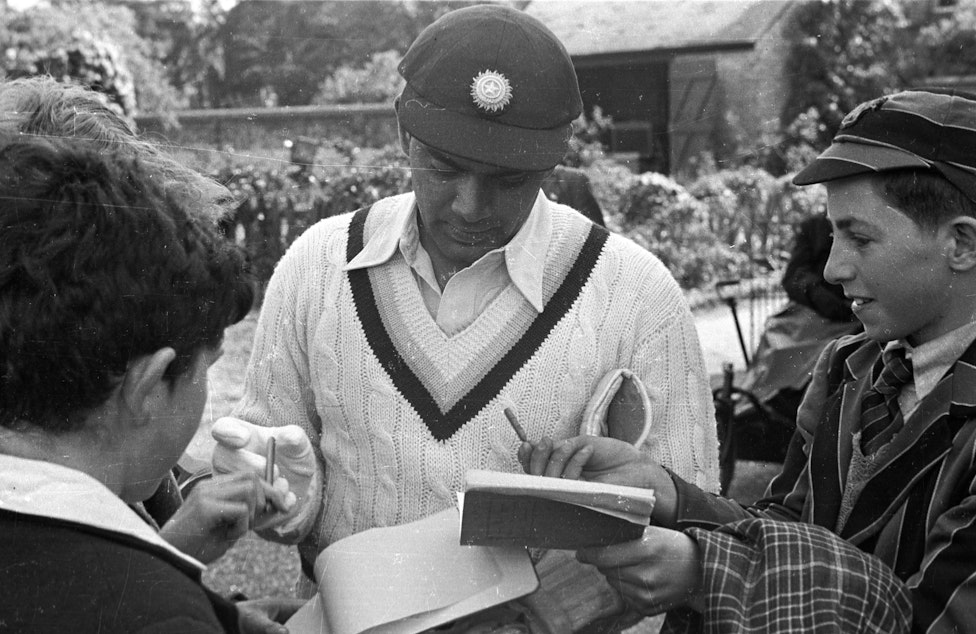 ON THIS DAY
ON THIS DAYSome records are not meant to be broken. Maharashtra’s Bhausaheb Babasaheb Nimbalkar learned it the hard way when the opposition team, Kathiawar, walked out of the match, leaving him stranded on 443.
It happened in 1948, during a Ranji Trophy game between Maharashtra and Kathiawar at the Poona Club Ground. Batting first, Kathiawar managed only 238 in their first innings, with their skipper Thakore Saheb of Rajkot, scoring 77, the highest score of his 13-match long first-class career.
In response, Maharashtra were batting at 826/4 when Tea was taken on Day 3. A session and a day were left in the match. Nimbalkar was batting on 443 not out, 10 runs short of surpassing Sir Donald Bradman’s record of the highest individual score in first-class cricket - 452 not out, scored in January 1930 against Queensland.
When the break was taken, none of the players were aware of the world record in sight, including Nimbalkar. The news broke when the players were taking Tea on the ground, as it used to happen in those days, and spread to the Kathiawar camp as well.
While Nimbalkar was looking forward to breaking Bradman’s record, Kathiawar's captain had a chat with the Maharashtra skipper and asked him to declare, or else he would walk off with his team.
The Maharashtra captain, Yeshwant Gokhale, requested his opposite number to continue for two more overs, thus giving Nimbalkar a shot at Bradman’s record. The Kathiawar skipper simply refused, saying they don't need more runs. He wasn’t wrong. In those days, drawn matches were awarded to the team with first innings lead, normalizing towering first innings totals.
Consequently, Maharashtra were also in sight of breaking Holkar’s record of the highest team total in Ranji Trophy cricket. Holkar had mounted 912/8d against Karnataka in March 1946.
However, no play happened post tea. The Kathiawar team packed their bags and headed to the station to board the train home. Maharashtra won by default with Kathiawar forfeiting the fixture. Nimbalkar believed they did not want the record to come against their name.
“They kept saying that you have already scored so many runs, why do you want to get more,” Nimbalkar said later. “Their skipper felt that the name of the Kathiawar team would figure in the record books for the wrong reasons. I was left stranded in the middle of the ground. I didn’t like the approach of the Kathiawar team.
“How could they be so unsporting? Once I came to know that I was just 10 runs short of a world record, I was desperate to achieve it because it would have put Sir Don’s name behind me. But this didn’t happen.
"Had I known, I would have gone for the runs. My captain sent me a message that I should stay at the wicket, so I did just as I was asked. I did not put my personal objectives ahead of the side. I played for the team." he recalled later.
Nimbalkar's score is still the only 400-plus score by an Indian batsman. The right-hander batted for eight hours and 14 minutes, scoring 49 fours and one six, ie, 202 runs in boundaries. Later, Sir Don Bradman sent Nimbalkar a personal message congratulating him for the record, stating that Nimbalkar's innings was better than his 452.
“I still remember he ranked my innings above his own, such was the greatness of The Don. Even though he had the world record and I had only the record in India, he still rated my innings as better,” Nimbalkar stated.
Bradman’s record was eventually surpassed by Hanif Mohammad in January 1959. Only 24 at that time, Mohammad scored 499 playing for Karachi against Bahawalpur. He was run out looking for his 500th run. Another 35 years later, Brian Lara scored an unbeaten 501, playing for Warwickshire against Durham in County Championship in June 1994. Unlike Kathiawar, Durham stayed in the park until Lara hit the record-breaking boundary in a dull draw. The game was done the moment Lara broke the record and ended in a draw.
Nimbalkar featured in 80 first-class games, scoring 4,841 runs, averaging 47.9 with the help of 12 hundreds and 22 fifties. He also picked 58 wickets with his medium pace. He never played for India, even though he was 29 at the time of his mammoth innings of 443 not out. In 1949-50, he featured in an unofficial Test against the Commonwealth XI.
"I don't know why the selectors sidelined me all the time. What really hurt me was that some of the less talented players got a chance to represent the country,” he said about his misfortune.
However, that hint of bad luck has actually given him a world record - the highest first-class score by a batsman who never played Test cricket.
Nimbalkar passed away in 2012, aged 92.